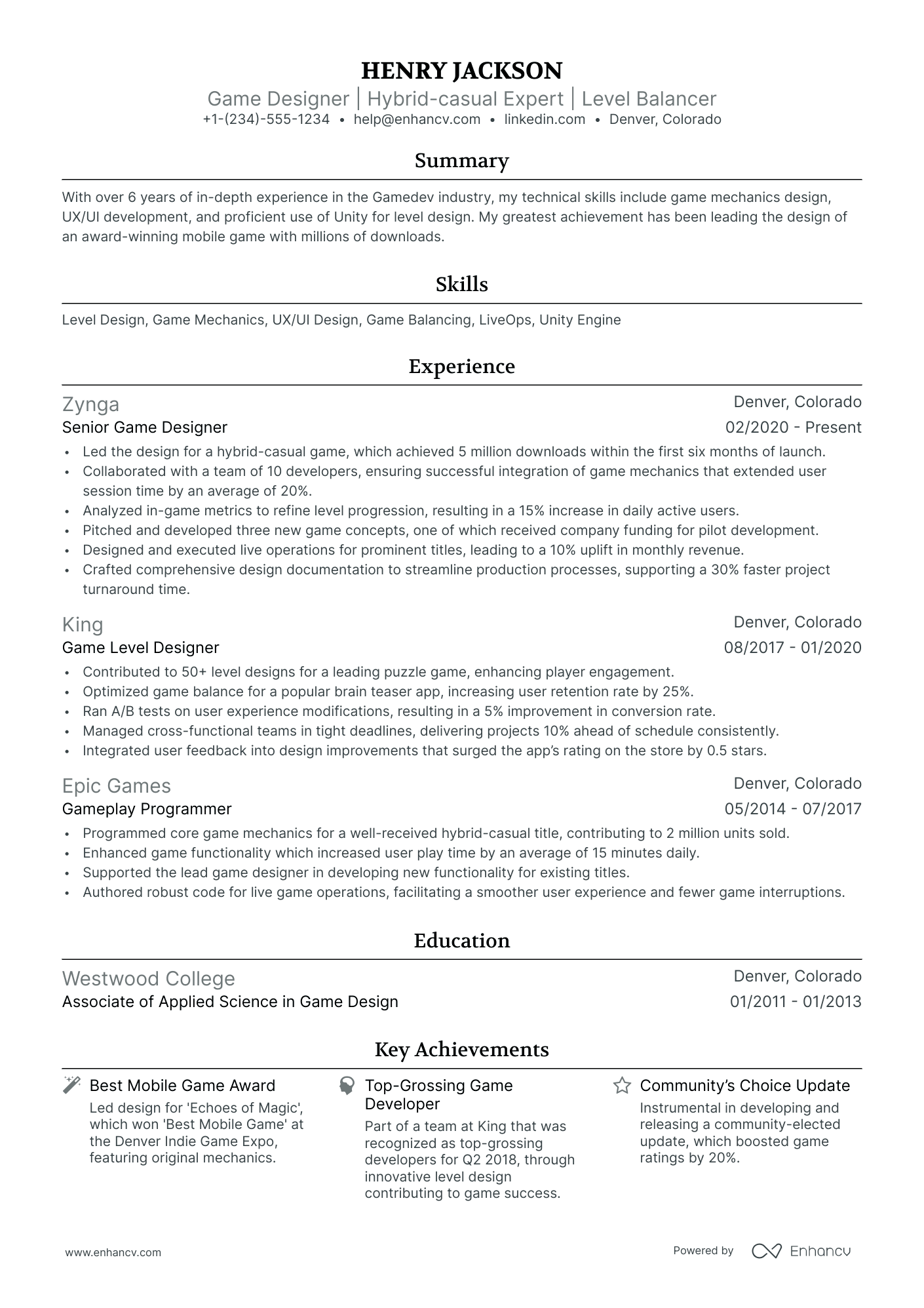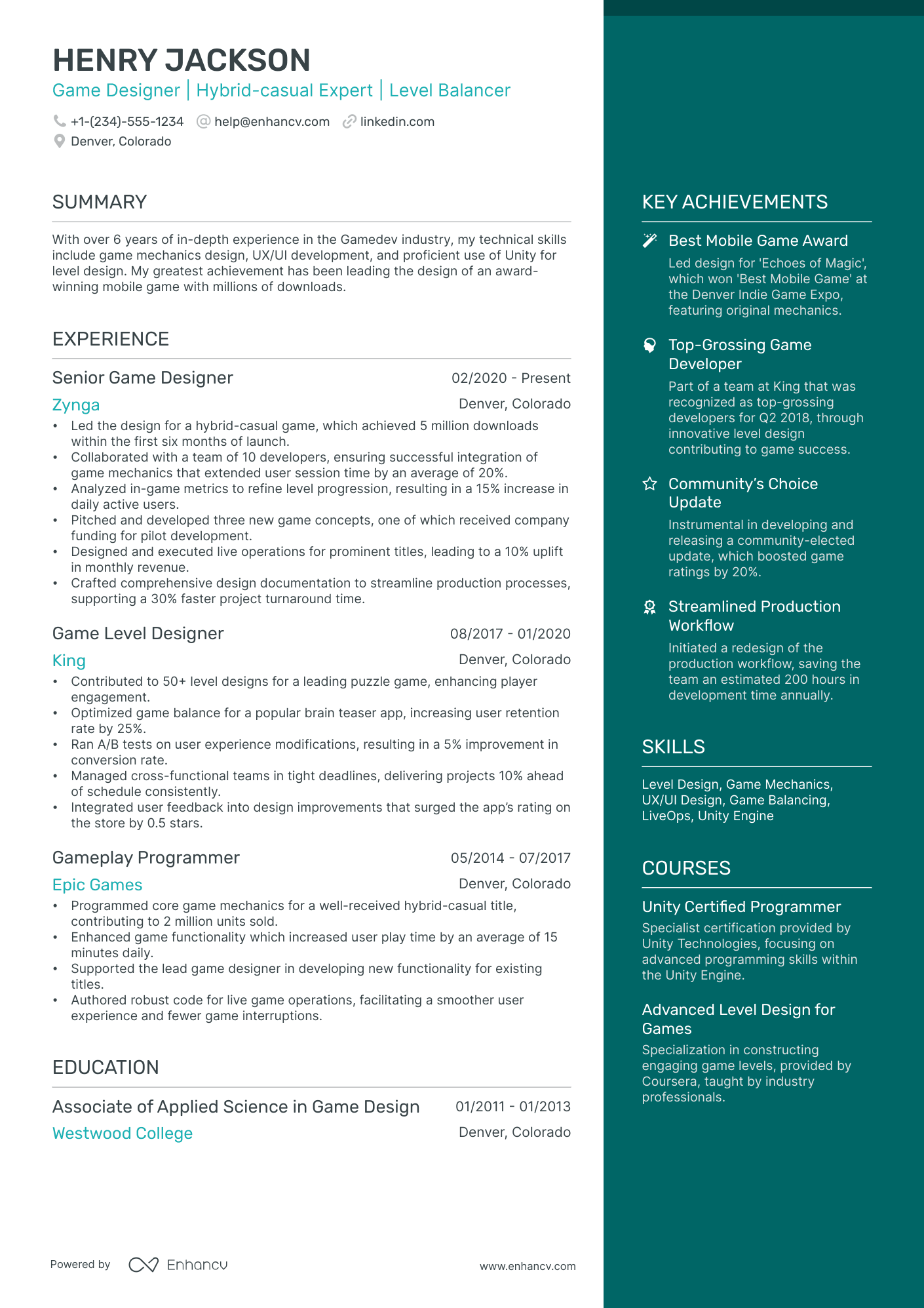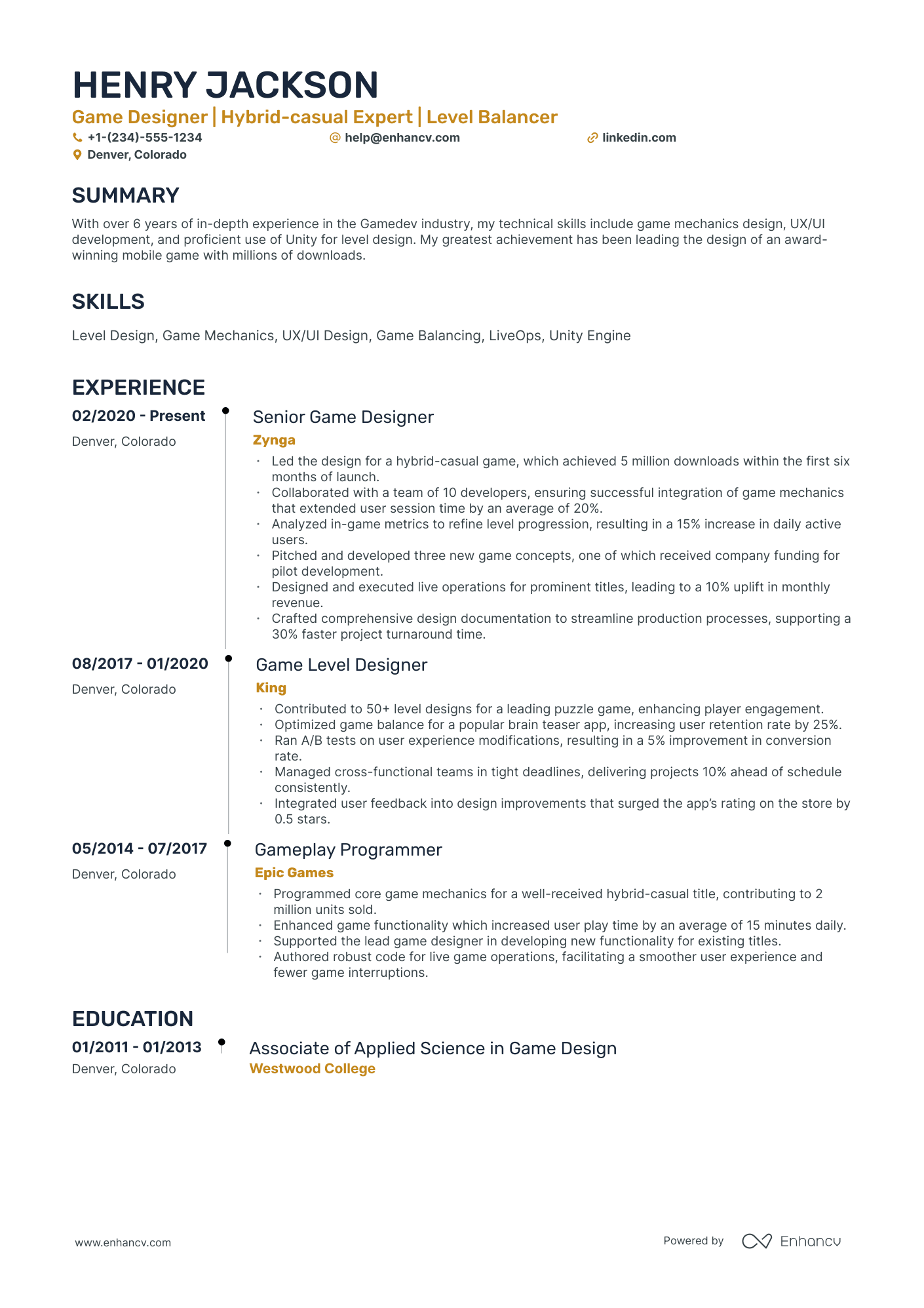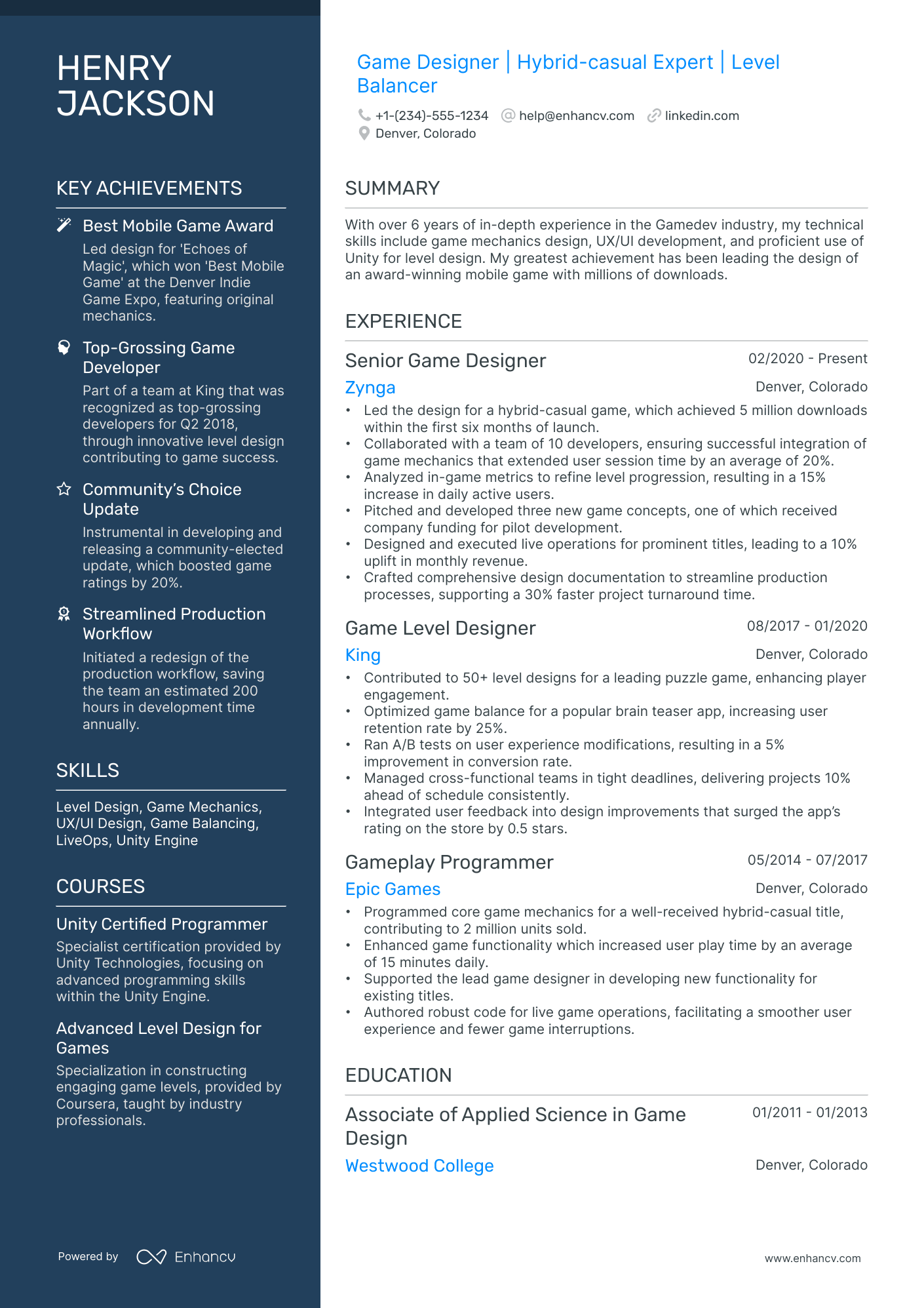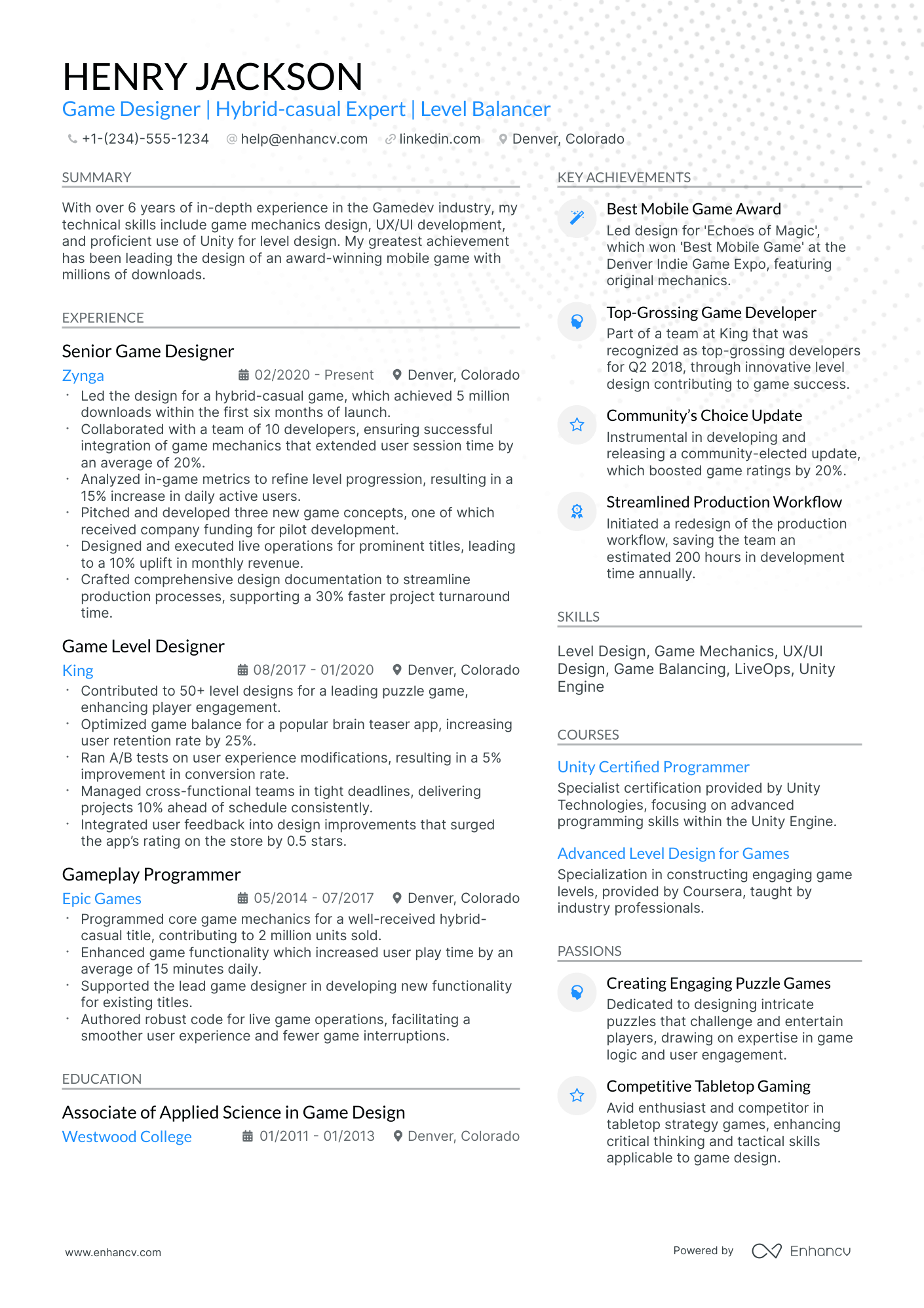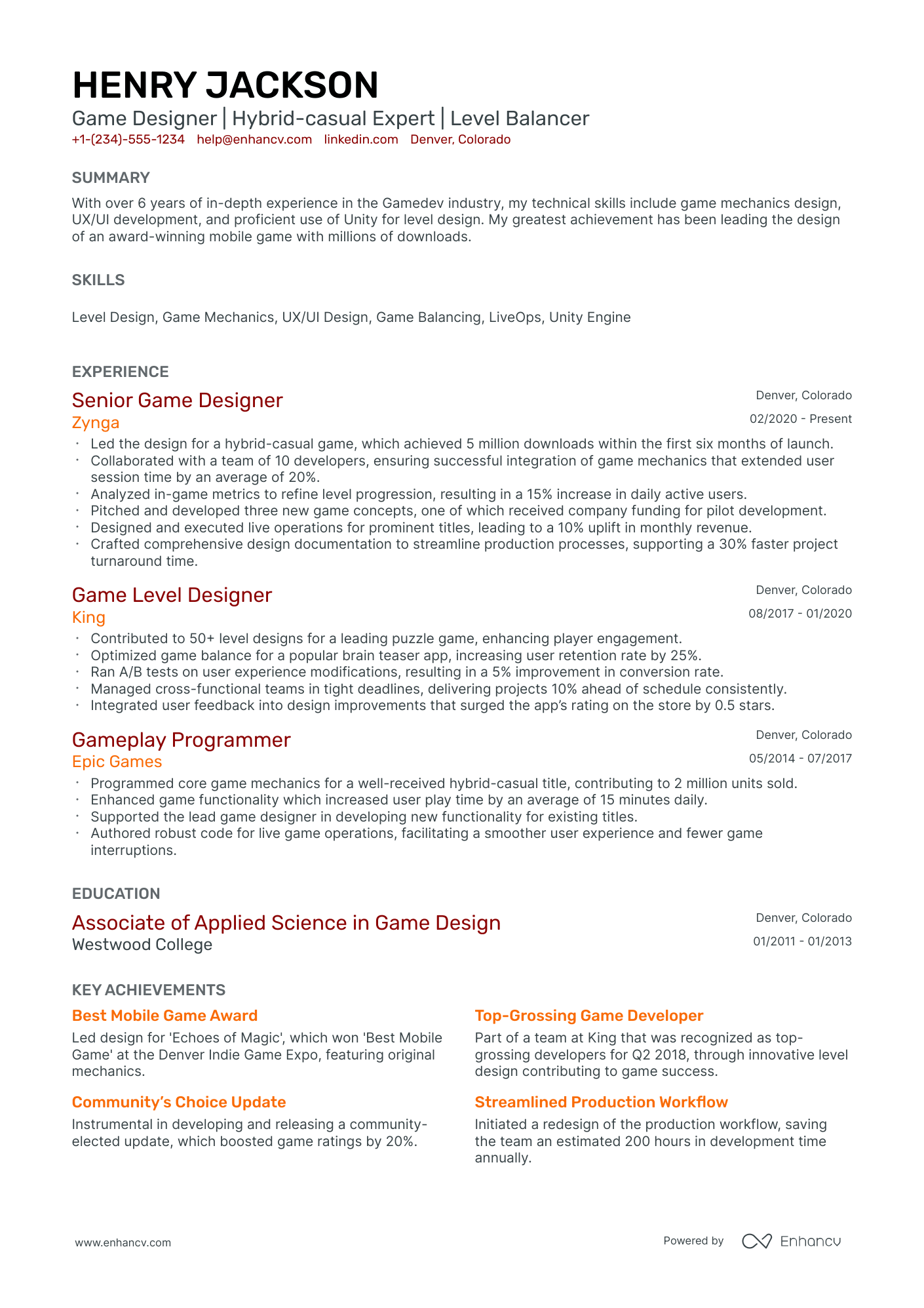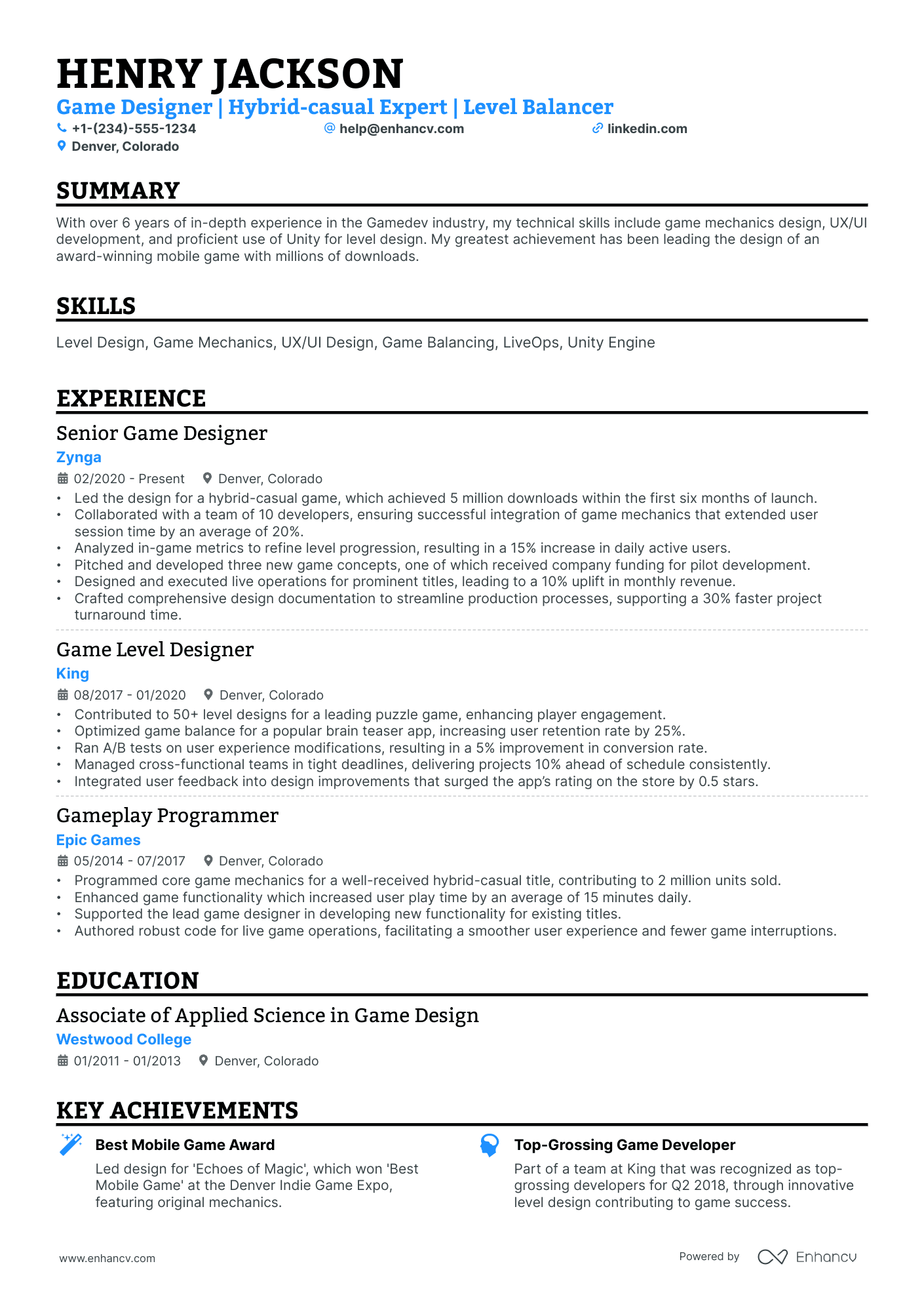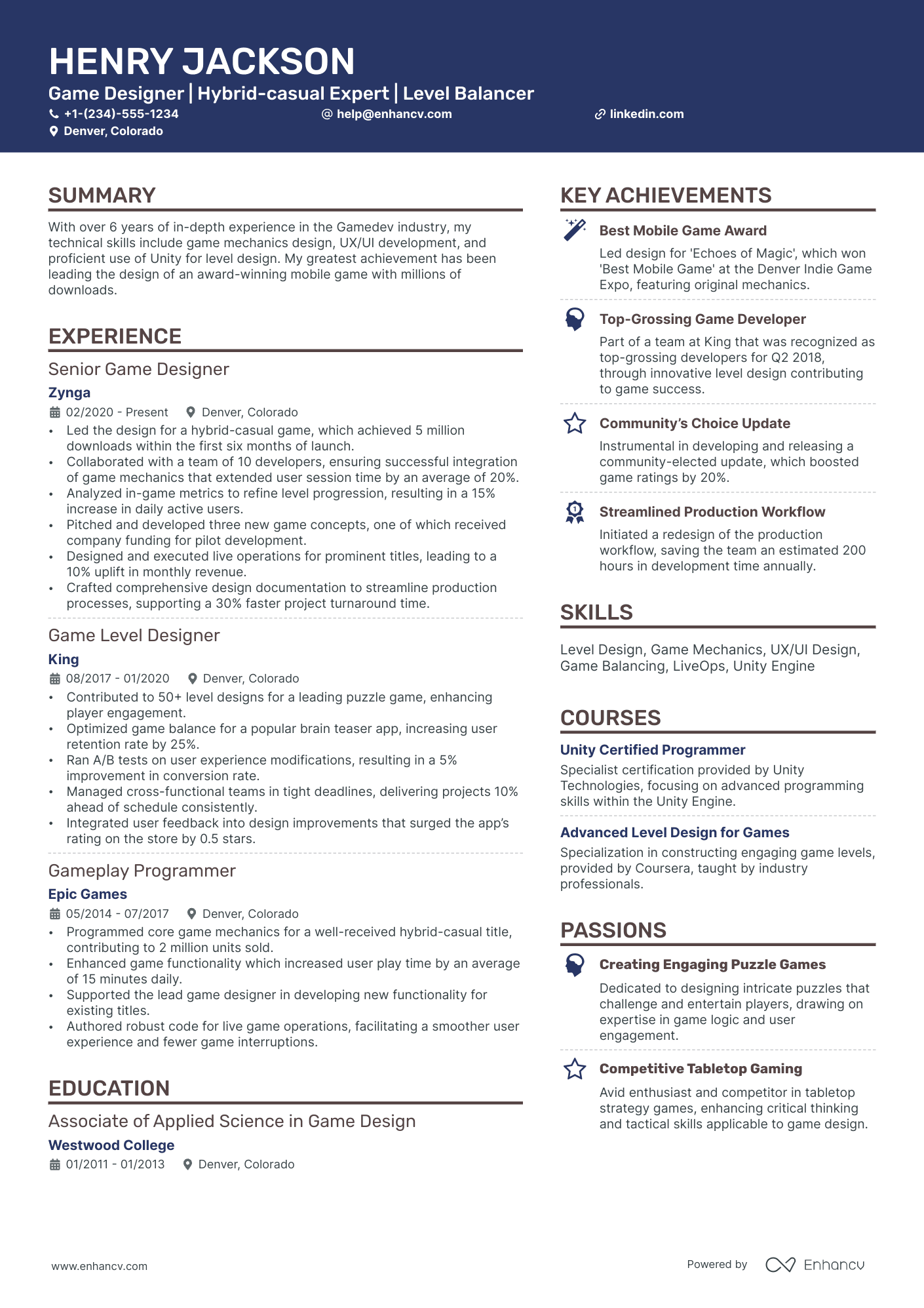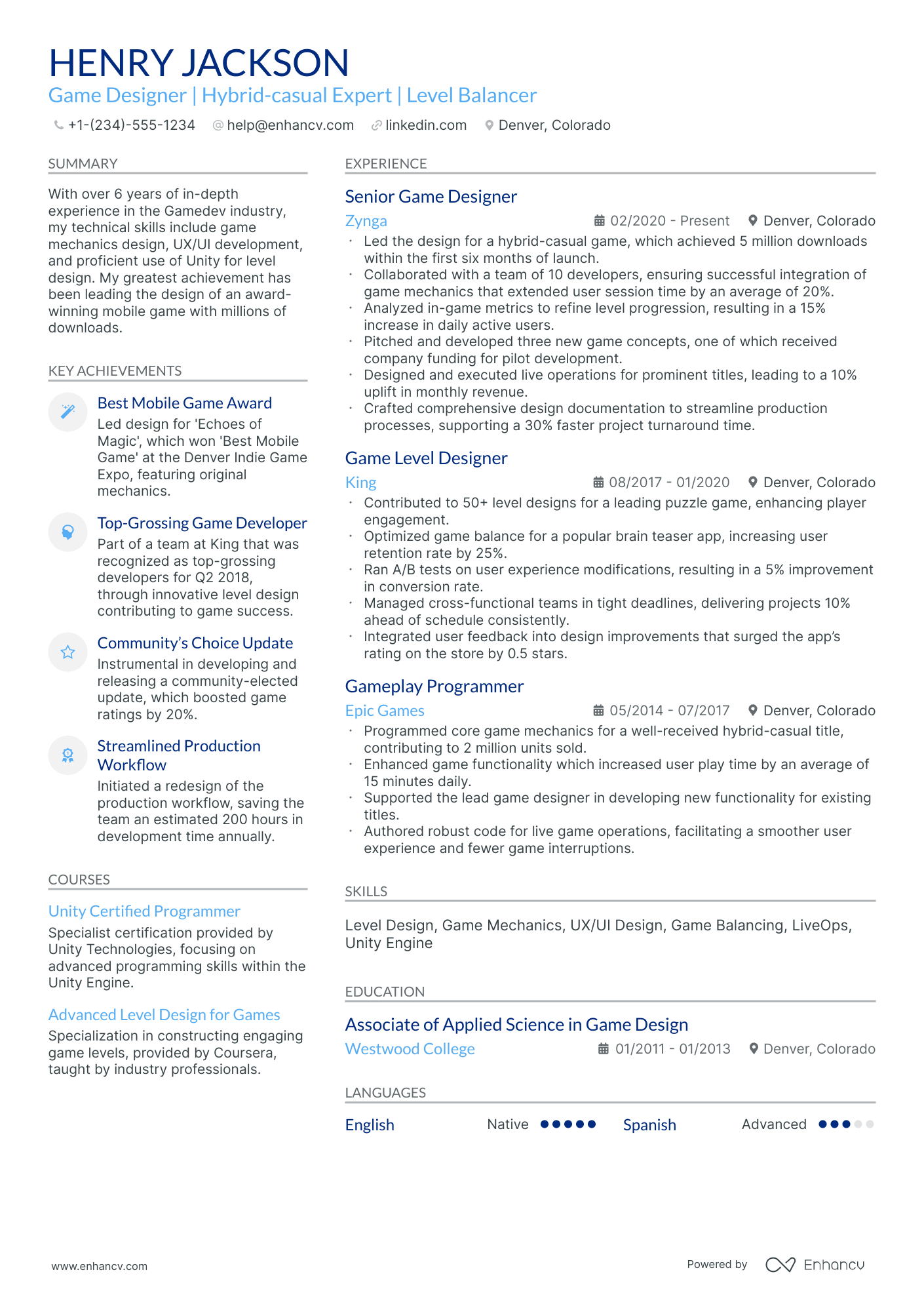One resume challenge you may face as a game designer is effectively showcasing your diverse skill set, including programming, storytelling, and artistic design, in a concise and compelling manner. Our guide offers targeted advice on structuring your experience and projects to highlight your unique talents, ensuring your resume stands out to potential employers in the gaming industry.
- Find different game designer resume examples to serve as inspiration to your professional presentation.
- How to use the summary or objective to highlight your career achievements.
- How to create the experience section to tell your story.
- Must have certificates and what to include in the education section of your resume.
If the game designer resume isn't the right one for you, take a look at other related guides we have:
- Design Manager Resume Example
- Retail Designer Resume Example
- Apparel Designer Resume Example
- Brand Designer Resume Example
- Lighting Designer Resume Example
- Interactive Designer Resume Example
- Creative Director Resume Example
- Visual Designer Resume Example
- 3D Artist Resume Example
- Electrical Designer Resume Example
Professional game designer resume format advice
Achieving the most suitable resume format can at times seem like a daunting task at hand.
Which elements are most important to recruiters?
In which format should you submit your resume?
How should you list your experience?
Unless specified otherwise, here's how to achieve a professional look and feel for your resume.
- Present your experience following the reverse-chronological resume format . It showcases your most recent jobs first and can help recruiters attain a quick glance at how your career has progressed.
- The header is the must-have element for your resume. Apart from your contact details, you could also include your portfolio and a headline, that reflects on your current role or a distinguishable achievement.
- Select relevant information to the role, that should encompass no more than two pages of your resume.
- Download your resume in PDF to ensure that its formatting stays intact.
The layout of a resume can differ by region – Canadian resumes may use a distinct format.
Upload & Check Your Resume
Drop your resume here or choose a file. PDF & DOCX only. Max 2MB file size.
PRO TIP
List all your relevant higher education degrees within your resume in reverse chronological order (starting with the latest). There are cases when your PhD in a particular field could help you stand apart from other candidates.
Traditional sections, appreciated by recruiters, for your game designer resume:
- Clear and concise header with relevant links and contact details
- Summary or objective with precise snapshot of our career highlights and why you're a suitable candidate for the game designer role
- Experience that goes into the nuts and bolts of your professional qualifications and success
- Skills section(-s) for more in-depth talent-alignment between job keywords and your own profile
- Education and certifications sections to further show your commitment for growth in the specific niche
What recruiters want to see on your resume:
- Demonstrated experience in game development tools and engines (e.g., Unreal Engine, Unity).
- Strong portfolio showcasing completed game projects or game design elements like level design, mechanics, or game narratives.
- Understanding of game design principles and ability to articulate design process and reasoning.
- Proficiency in programming languages (for technical designers) or art software (for artistic roles).
- Experience with collaborative work in a cross-functional team and knowledge of the game production pipeline.
Quick guide to your game designer resume experience section
After deciding on the format of your resume, it's time to organize your experience within the dedicated section.
It's common for game designer professionals to be confused in this part of the process, as they may have too much or little expertise.
Follow the general rules of thumb to be successful when writing this part of your resume:
- The perfect number of bullets you should have under each experience item is no more than six;
- Select not merely your responsibilities, but the most noteworthy achievements for each role that match the job requirements;
- List any certificates or technical expertise you've gained on the job and how they've helped you progress as a professional;
- Carefully select the power verbs to go along with each bullet to avoid generic ones like "managed" and instead substitute those with the actuality of your particular responsibility;
- Integrate valuable keywords from the job advert in the form of achievements under each role you list.
If you're on the search for further advice on how to write your game designer experience section, get some ideas from real-world professional resumes:
- Led the development of a new action RPG title which increased player retention by 40% over the previous franchise installment.
- Created engaging level designs, introducing innovative puzzle mechanics that enhanced the user experience and received positive critical acclaim.
- Collaborated closely with the cross-functional team to ensure cohesive game art and mechanics, meeting a 95% approval rating from our beta testing group.
- Revitalized a classic game series by leading a design team that brought fresh and contemporary elements, resulting in a 50% increase in sales.
- Spearheaded a player feedback program which informed design adjustments that contributed to a 30% decrease in negative reviews.
- Implemented a mentorship program for junior designers, increasing team productivity by 25% and fostering a culture of continuous learning.
- Directed the narrative design of a story-driven open-world game, surpassing the company's engagement goals with average play sessions lasting 3 hours.
- Incorporated innovative AI-driven character behavior which was highlighted as a key selling point and improved critical NPC interactions by over 60%.
- Managed the game balance of in-game economies, which contributed to a 20% increase in microtransaction revenues within the first quarter post-launch.
- Developed a mobile strategy game that reached 1 million downloads within the first 6 months and maintained a 4.5-star rating across platforms.
- Introduced a live-events framework that boosted player engagement by 35% and became a model for subsequent titles.
- Collaborated with the marketing team to create trailers and promotional material, contributing to a successful game launch covered by major industry outlets.
- Implemented user-generated content tools within a sandbox game, empowering players to create over 100,000 unique level designs.
- Optimized game mechanics based on analytics and player behavior, resulting in a 25% uptick in daily active users.
- Conducted usability testing to streamline game UI/UX, contributing to a 40% reduction in user reported issues.
- Designed core combat systems for a multiplayer online battle arena game, which supported a concurrent user peak of 500,000 players.
- Developed a character progression system that was lauded for its innovation, enhancing player investment in character builds.
- Orchestrated competitive playtests and balanced character abilities, drastically reducing the occurrence of dominant strategies in competitive play by 40%.
- Drove the concept and design of a new tactical shooter game, pitching to executives and securing a $5 million budget for the first development phase.
- Integrated cutting-edge VR technology into the gaming experience, enhancing player immersion and contributing to a 20% increase in pre-order sales.
- Headed a cross-departmental task force to align game mechanics with emergent technologies, leading to the game winning 'Innovation of the Year' at the Game Developers Conference.
- Designed and iterated on puzzle mechanics for a hit casual game series, which became a top-5 game in its category in over 10 countries.
- Facilitated player testing sessions and analyzed data to refine game difficulty curves, boosting player progression rates by 30%.
- Engaged with the player community through forums and social media to collect actionable feedback, enhancing customer satisfaction and loyalty.
The following content includes information from "O*NET OnLine" by the U.S. Department of Labor, Employment and Training Administration (USDOL/ETA). Used under the CC BY 4.0 license. The data represents the top responsibilities present on the task lists for game designer professionals.
Top Responsibilities for Game Designer:
- Balance and adjust gameplay experiences to ensure the critical and commercial success of the product.
- Devise missions, challenges, or puzzles to be encountered in game play.
- Create core game features, including storylines, role-play mechanics, and character biographies for a new video game or game franchise.
- Solicit, obtain, and integrate feedback from design and technical staff into original game design.
- Conduct regular design reviews throughout the game development process.
- Develop and maintain design level documentation, including mechanics, guidelines, and mission outlines.
- Document all aspects of formal game design, using mock-up screenshots, sample menu layouts, gameplay flowcharts, and other graphical devices.
- Provide feedback to designers and other colleagues regarding game design features.
- Create and manage documentation, production schedules, prototyping goals, and communication plans in collaboration with production staff.
- Provide feedback to production staff regarding technical game qualities or adherence to original design.
Quantifying impact on your resume
- Highlight the number of successful games you have designed to demonstrate your experience and productivity in the field.
- Quantify the number of levels, characters, or assets you created for each project to showcase your contribution and creativity.
- Include the number of players or downloads for your most popular games as evidence of your designs' market appeal and success.
- Specify the percentage increase in user engagement or retention you achieved through your designs to show your impact on key performance indicators.
- Mention the amount of revenue generated by your games to illustrate your understanding of the business aspect and your financial contribution.
- Indicate the size of the teams you've collaborated with to reflect your teamwork and project management skills.
- Detail any efficiency improvements, like reduced development time or budget savings, with precise percentages to underscore your optimization abilities.
- Present any awards or recognitions you've received in numerical terms, such as ranking or number of competitors, to validate your expertise and industry standing.
Action verbs for your game designer resume
Four quick steps for candidates with no resume experience
Those with less or no relevant experience could also make a good impression on recruiters by:
- Taking the time to actually understand what matters most to the role and featuring this within key sections of their resume
- Investing resume space into defining what makes them a valuable candidate with transferrable skills and personality
- Using the resume objective to showcase their personal vision for growth within the company
- Heavily featuring their technical alignment with relevant certifications, education, and skills.
Remember that your resume is about aligning your profile to that of the ideal candidate.
The more prominently you can demonstrate how you answer job requirements, the more likely you'd be called in for an interview.
Recommended reads:
PRO TIP
Always remember that your game designer certifications can be quantified across different resume sections, like your experience, summary, or objective. For example, you could include concise details within the expertise bullets of how the specific certificate has improved your on-the-job performance.
How to showcase hard skills and soft skills on your resume
Reading between the lines of your dream job, you find recruiters are looking for candidates who have specific software or hardware knowledge, and personal skills.
Any technology you're adept at shows your hard skills. This particular skill set answers initial job requirements, hinting at how much time your potential employers would have to invest in training you. Showcase you have the relevant technical background in your communicate, solve problems, and adapt to new environments. Basically, your interpersonal communication skills that show recruiters if you'd fit into the team and company culture. You could use the achievements section to tie in your greatest wins with relevant soft skills.
It's also a good idea to add some of your hard and soft skills across different resume sections (e.g. summary/objective, experience, etc.) to match the job requirements and pass the initial screening process. Remember to always check your skill spelling and ensure that you've copy-pasted the name of the desired skills from the job advert as is.
Top skills for your game designer resume:
Unity
Unreal Engine
C#
Game Physics
Level Design
3D Modeling
Game Balancing
Storyboarding
Prototyping
Game Analytics
Creativity
Problem-Solving
Team Collaboration
Communication
Adaptability
Time Management
Critical Thinking
Attention to Detail
Empathy
Project Management
Next, you will find information on the top technologies for game designer professonals from "O*NET OnLine" by the U.S. Department of Labor, Employment and Training Administration (USDOL/ETA). Used under the CC BY 4.0 license.
Top technologies for Game Designer’s resume:
- C
- Microsoft Visual Studio
- Blackboard software
- Microsoft SQL Server
- C#
- Objective C
PRO TIP
If the certificate you've obtained is especially vital for the industry or company, include it as part of your name within the resume headline.
How to include your education and certifications on your resume
We're taking you back to your college days with this part of our guide, but including your relevant higher education is quite important for your resume.
Your degree shows recruiters your dedication to the industry, your recent and relevant know-how, and some form of experience in the field.
Your game designer resume education should:
- Include your applicable degrees, college (-s) you've graduated from, as well as start and end dates of your higher education;
- Skip your high school diploma. If you still haven't graduated with your degree, list that your higher education isongoing;
- Feature any postgraduate diplomas in your resume header or summary - this is the perfect space to spotlight your relevant MBA degree;
- Showcase any relevant coursework, if you happen to have less professional experience and think this would support your case in being the best candidate for the role.
As far as your job-specific certificates are concerned - choose up to several of the most recent ones that match the job profile, and include them in a dedicated section.
We've saved you some time by selecting the most prominent industry certificates below.
The top 5 certifications for your game designer resume:
- Unity Certified User: Programmer (UCU-P) – Unity Technologies
- Certified Video game designer (CVGD) – Digital Media Academy
- Adobe Certified Associate (ACA) – Adobe
- Game Design and Development Certificate – Coursera (offered by various universities)
- Autodesk Certified Professional: Maya for Game Developers (ACP) – Autodesk
The content below includes information from "O*NET OnLine" by the U.S. Department of Labor, Employment and Training Administration (USDOL/ETA). Used under the CC BY 4.0 license. The data represents the top associations for game designer professionals.
Top US associations for a Game Designer professional
- Academy of the Interactive Arts and Sciences
- Association for Computing Machinery
- Computing Research Association
- Higher Education Video Game Alliance
- IEEE Computer Society
PRO TIP
If the certificate you've obtained is especially vital for the industry or company, include it as part of your name within the resume headline.
Recommended reads:
Professional summary or objective for your game designer resume
game designer candidates sometimes get confused between the difference of a resume summary and a resume objective.
Which one should you be using?
Remember that the:
- Resume objective has more to do with your dreams and goals for your career. Within it, you have the opportunity to showcase to recruiters why your application is an important one and, at the same time, help them imagine what your impact on the role, team, and company would be.
- Resume summary should recount key achievements, tailored for the role, through your career. Allowing recruiters to quickly scan and understand the breadth of your game designer expertise.
The resume objectives are always an excellent choice for candidates starting off their career, while the resume summary is more fitting for experienced candidates.
No matter if you chose a summary or objective, get some extra inspiration from real-world professional game designer resumes:
Resume summaries for a game designer job
- With over a decade of experience in AAA game design at renowned studios like Epic Games, I bring a wealth of expertise in Unreal Engine 4, narrative crafting, and user engagement strategies. My greatest achievement includes leading the design of a blockbuster title that garnered Game of the Year accolades and exceeded 5 million units sold within the first six months.
- As a Senior AI Programmer with 15 years in the technology sector, specializing in machine learning and complex algorithms, I’m transitioning to game design. I aim to leverage my technical acumen to create sophisticated game mechanics and immersive AI experiences. I have a proven track record of developing software used by millions and hold several patents in AI technologies.
- After a successful 8-year tenure in digital animation for major film studios, including Disney and Pixar, I am pivoting to the gaming industry. My comprehensive understanding of storytelling, 3D animation, and character development, coupled with a passion for interactive media, will be vital in crafting engaging game worlds and memorable characters.
- Freshly graduated with a B.S. in Computer Science and a focus on interactive entertainment, I am eager to apply my academic knowledge and game theory expertise. Although new to the industry, I have designed and developed several indie games during university, one of which received an award at a national indie game festival.
- Seeking an entry-level game designer position that allows me to contribute my strong passion for role-playing games and interactive storytelling. Equipped with a deep understanding of game design principles from my recent MFA in Game Design, I am prepared to take on challenges and grow within a dynamic team, utilizing my skills to create memorable gaming experiences.
- Enthusiastic about harnessing the creative potential of VR and AR in gaming, I am a recent graduate from the Interactive Media Design program with no prior industry experience but with a strong portfolio demonstrating innovative game prototypes. I seek to further develop my talents in a collaborative environment where I can merge technical prowess with artistic vision to push the boundaries of immersive gameplay.
Average salary info by state in the US for game designer professionals
Local salary info for Game Designer.” Source: My Next Move, National Center for O*NET Development. Accessed 10/15/2024
| State | Average Salary (in USD) |
|---|---|
| US National Average | $98,540 |
| California (CA) | $127,760 |
| Texas (TX) | $105,760 |
| Florida (FL) | $80,150 |
| New York (NY) | $117,090 |
| Pennsylvania (PA) | $78,920 |
| Illinois (IL) | $69,750 |
| Ohio (OH) | $80,100 |
| Georgia (GA) | $97,820 |
| North Carolina (NC) | $83,040 |
| Michigan (MI) | $73,180 |
Bonus sections for your game designer resume
Looking to show more personality on your game designer resume? Then consider including a couple of extra sections.
They'd benefit your application by highlighting your most prominent:
Key takeaways
We trust that this Enhancv guide has been informative and useful. To summarize the essential points:
- Opt for a simple and readable format, focusing more on your game designer achievements rather than just duties;
- Emphasize your accomplishments in the game designer experience section over mere responsibilities;
- If lacking relevant experience, utilize various resume sections like education and volunteering to demonstrate your suitable skill set;
- Never overlook the significance of pertinent higher education, training, and certifications;
- Incorporate diverse sections in your resume to highlight not just your skills expertise but also your personality.
